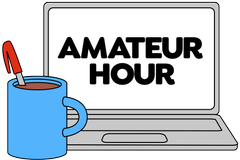Amateur Hour is an advice column for people who are new to the professional world and are figuring out how work even… works.
Advertisement
I like to go to bed early, and I go out of town to visit friends when I have a day off. I haven’t been to any of these bar nights because frankly, I think I’d be miserable. However, I’m worried that not participating will affect how I’m perceived. I’m anxious that skipping out on bar nights—especially when our boss goes—will make me look like I’m not a team player, not invested in my job, or aloof and uptight.
I want my boss to be a good reference when I’m looking for jobs after undergrad, and I’d like to be invited back to this program next summer. Do I need to go to the bar more often? Is this a normal work environment? How do I navigate this?In most offices, you absolutely do not need to drink to fit in or have good relationships with your coworkers and boss. There are some offices where professional pressure to drink is A Thing—but they’re (a) fairly rare and (b) toxic and dysfunctional.That doesn’t mean that it’s not useful to do a bit of socializing with your colleagues after hours, though. Going to the occasional happy hour or other work social event can help you build stronger relationships with people that can pay off professionally, with everything from job leads to some occasion when you need a favor from that guy in accounting. But that doesn’t mean you need to attend every time or stay for hours when you do! You can go once every few months (or, to adjust that for an office with multiple happy hours each week, maybe once a month), stay for an hour, talk to people, and then head home.
Advertisement
And if you don’t want to drink while you’re there, it’s perfectly OK to order something non-alcoholic. (If you expect to need to ward off pressure, seltzer with lime looks a lot like a vodka tonic.) If anyone asks why you’re not drinking, say you’re driving, or taking a medication you can’t combine with alcohol, or just not feeling like it. In an even halfway decent work culture, people will be fine with that.All that said… your office sounds a lot more devoted to drinking than most, both in terms of the frequency and the hungover colleagues. (In most workplaces, coming to work hungover isn’t a thing you should do, and definitely not something to publicize if it happens.) I’m curious whether you’re seeing this mainly from interns and other junior staff—which wouldn’t be ideal, but isn’t as uncommon—or whether you see more senior people participating with the same frequency and level of enthusiasm too. If it’s the latter… that’s unusual, and I’d worry about what’s going on in the culture there.It might be interesting to ask your boss for advice on this and see what he says. It’s normal for interns to have lots of questions about how to navigate work, and it would be perfectly appropriate to say to him, “I’ve noticed people go out for drinks after work a lot. I’m not a big drinker and I usually like to head home after work. I figured I’d drop by to hang out with people once every month or so but was hoping for your advice on whether people are expected to attend more than that, or whether it’s truly optional.” If this is a good work culture, his answer should be something like, “It’s useful to find ways to build relationships with your coworkers, but you don’t have to show up at the bar to do that.” If he says anything that strays from this general sentiment, that’s a big flashing warning sign about this company: think about how exclusionary its culture must be for parents with childcare responsibilities after work, recovering alcoholics, anyone who doesn’t drink for religious reasons, and a bunch of other people who wouldn’t be pumped for these bar nights.If that’s the case, the answer isn’t that you need to start attending a bunch of happy hours that you don’t want to be at. Instead, it would be a sign to consider whether this particular company is a good match for you. In fact, this is a really important professional skill to develop: the ability to recognize when a culture isn’t a good fit for you, and to be OK with moving on rather than making yourself miserable trying to survive a bad match.Get more good advice from Alison Green** at Ask a Manager or in her book. Do you have a pressing work-related question of your own? Submit it using this form.**
